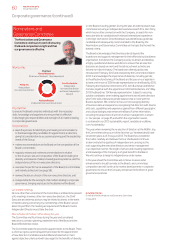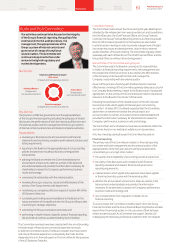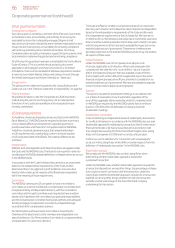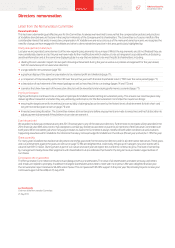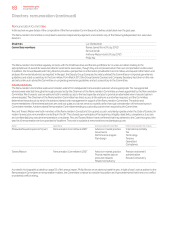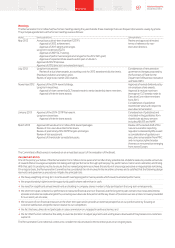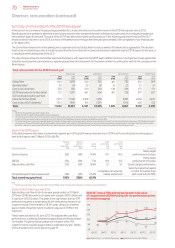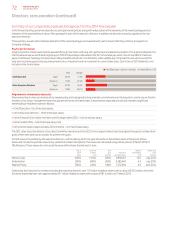Vodafone 2013 Annual Report Download - page 64
Download and view the complete annual report
Please find page 64 of the 2013 Vodafone annual report below. You can navigate through the pages in the report by either clicking on the pages listed below, or by using the keyword search tool below to find specific information within the annual report.
The primary areas of judgement considered by the Committee
in relation to the 2013 accounts, and how these were addressed, were:
a Goodwill impairment testing
The judgements in relation to asset impairment largely relate to the
assumptions underlying the calculation of the value in use of the
business being tested for impairment, primarily the achievability
of the long-term business plan and macroeconomic assumptions
underlying the valuation process. This is particularly challenging
in relation to the Group’s interests in Southern Europe given lower
medium-term visibility of economic and business performance and
material changes in other valuation assumptions. The Committee
addresses these matters through receiving reports from
management outlining the basis for the assumptions used. Business
plans are Board approved. In addition, this area is a prime source
of audit focus and accordingly Deloitte LLP provide detailed reporting
to the Committee.
a Taxation
Provisioning for potential current tax liabilities and the level
of deferred tax asset recognition in relation to accumulated tax
losses are underpinned by a range of judgements. The Committee
addresses these issues through a range of reporting from senior
management and a process of challenging the appropriateness
of management’s views including the degree to which these are
supported by professional advice from external legal and other
advisory rms. This is also an area of higher audit risk and accordingly
the Committee receives detailed verbal and written reporting from
Deloitte LLP on these matters.
a Liability provisioning
The level of provisioning for contingent and other liabilities is an issue
where management and legal judgements are important. These are
addressed through the Committee discussing with management
the key judgements made, including relevant legal advice that
may have been received. Deloitte LLP also report on all material
contingent liabilities.
Internal control
We reviewed the process by which the Group evaluated its control
environment. Our work here was driven primarily by the Group
Audit Director’s reports on the effectiveness of internal controls,
signicant identied frauds and any identied fraud that involved
management or employees with a signicant role in internal controls.
In addition we received updates from the Group’s Compliance
Director on compliance related activities. I meet privately with the
Group’s Internal Audit and Compliance Directors outside the formal
committee process as necessary.
During the year the Committee also conducted in-depth reviews into
the control environments and risk management processes in a number
of our markets and also conducted a review of the internal audit
function. This review included the scope of Internal Audit’s activity
and resourcing together with areas of focus and planning for the next
three years.
Oversight of the Group’s compliance activities in relation to section 404
of the Sarbanes-Oxley Act also fell within the Committee’s remit.
Risk management
The Group’s risk assessment process and the way in which signicant
business risks are managed is a key area of focus for the Committee.
Our work here was driven primarily by the Group’s assessment of its
principal risks and uncertainties, as set out on pages 46 to 49. We receive
reports from the Group Audit Director on the Group’s risk evaluation
process and review changes to signicant risks identied at both
operating entity and Group levels.
Information security is another area of regular focus for the Committee.
During the year we conducted a further in-depth review of the security
around IT infrastructure and customer information.
In addition the Committee also conducted in-depth reviews into the
Group’s nance operations transformation programme and assessment
of tax risks.
We view these reviews as being critical to the role of the Committee,
as they allow us to meet key business leaders responsible for these
areas and provide independent challenge to their activities.
Internal audit
Monitoring and review of the scope, extent and effectiveness of the
activity of the Group Internal Audit department is an agenda item
at each Committee meeting. Reports from the Group Audit Director
usually include updates on audit activities, progress of the Group audit
plan, the results of any unsatisfactory audits and the action plans
to address these areas, and resource requirements of the Internal
Audit department. Further we receive summaries of investigations
into known or suspected fraudulent activities by both third parties and
employees. We hold private discussions with the Group Audit Director
as necessary throughout the year and I also meet with him regularly
outside the formal committee process and play a major role in setting
his annual objectives.
External audit
The effectiveness of the external audit process is dependent
on appropriate audit risk identication at the start of the audit cycle.
We receive from Deloitte LLP a detailed audit plan, identifying their
assessment of these key risks. For the 2013 nancial year the primary
risks identied were in relation to goodwill impairment, provisioning
for current tax liabilities and deferred tax asset recognition, due to the
inherent management judgement required in these areas. These
risks are tracked through the year and we challenged the work done
by the auditors to test management’s assumptions and estimates
around these areas. We assess the effectiveness of the audit process
in addressing these matters through the reporting we receive from
Deloitte LLP at both the half-year and year end. In addition we also seek
feedback from management on the effectiveness of the audit process.
For the 2013 nancial year, management were satised that there had
been appropriate focus and challenge on the primary areas of audit risk
and assessed the quality of the audit process to be good. The Audit and
Risk Committee concurred with the view of management.
We hold private meetings with the external auditor at each
Committee meeting to provide additional opportunity for open
dialogue and feedback from the Committee and the auditor without
management being present. Matters typically discussed include
the auditor’s assessment of business risks and management activity
thereon, the transparency and openness of interactions with
management, conrmation that there has been no restriction in scope
placed on them by management, independence of their audit and
how they have exercised professional scepticism. I also meet with the
external lead audit partner outside the formal committee process
throughout the year.
Appointment and independence
The Committee considers the reappointment of the external auditor,
including the rotation of the audit partner, each year and also assesses
their independence on an ongoing basis. The external auditor is required
to rotate the audit partner responsible for the Group audit every ve
years. The current lead audit partner has been in place for four years.
Deloitte LLP has been the Company’s external auditor since its stock
market listing in 1988 (25 years). Whilst the Group has not formally
tendered the audit since then, as part of the Committee’s review
of the objectivity and effectiveness of the audit process a detailed
Corporate governance (continued)
62 Vodafone Group Plc
Annual Report 2013










